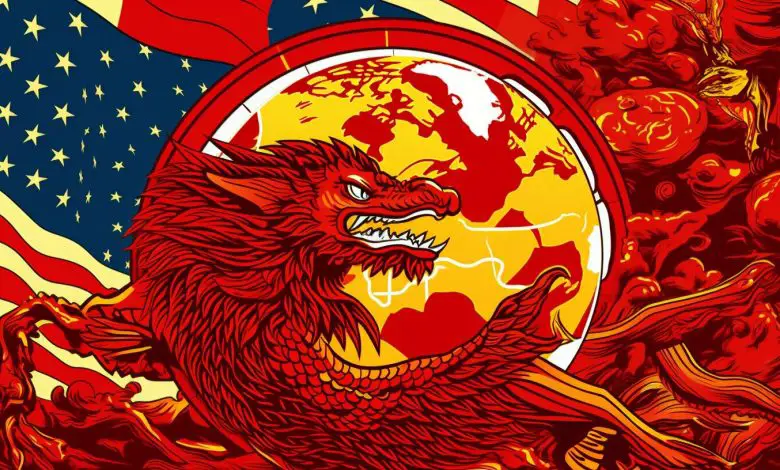Understanding the Dynamics: China vs US in Global Politics

The dynamics between China and the United States in global politics are highly complex and evolving. Both countries are major global powers in terms of economic scale, military spending, technology, and energy consumption. Various countries around the world are grappling with how to navigate their relations with both powers.
India sees itself in a delicate position, benefiting from a balanced rivalry between the U.S. and China while not wanting to be forced to choose a side. Japan faces challenges as it is economically integrated with China but relies on the U.S. for security. The United Kingdom and the European Union are carefully considering their relationships with China, particularly regarding technology and infrastructure.
Germany serves as a key battleground for U.S.-China competition due to its economic ties with both countries. The European Union as a whole recognizes China as a systemic rival but also remains the chief investor in Europe’s infrastructure. Turkey presents a unique challenge for China due to competition and mistrust, as well as concerns over human rights. Russia has an adversarial history with the U.S. but also a complex relationship with China, leading to policy convergence between the two powers.
The COVID-19 pandemic has added fuel to U.S.-China rivalry, and when the crisis recedes, the underlying tensions will persist. The U.S. and China have a long history of competition but have also shown intentions for peaceful coexistence. The two powers share responsibility for global issues and avoiding military conflict should be a common desire. However, their domestic challenges, such as corruption and social unrest in China and governance issues and social divisions in the U.S., could impact their relationship.
It is crucial for both countries to make efforts to address these challenges and find opportunities for cooperation to avoid a catastrophic confrontation.
Key Takeaways:
- The China-US relationship in global politics is highly complex and constantly changing.
- Other countries around the world must carefully navigate their relationships with both China and the United States.
- India benefits from a balanced rivalry between the U.S. and China but wants to avoid choosing sides.
- Japan faces challenges with its economic integration with China and reliance on U.S. security.
- The United Kingdom, the European Union, and Germany have important considerations regarding their relationships with China.
The China-US Trade War: A Battle for Economic Supremacy
The trade war between China and the US has become a pivotal battleground for economic supremacy. The tensions between these two global powers have given rise to a series of tariffs, trade restrictions, and retaliatory measures that have significantly impacted the world economy. To better understand the implications of this trade war, let’s take a closer look at the key aspects driving the conflict.
First and foremost, the trade deficit between China and the US has been a major point of contention. The US has long criticized China for its unfair trading practices, such as intellectual property theft, forced technology transfers, and state subsidies. The US believes that these practices have contributed to the significant trade deficit it faces with China. As a result, the US has imposed tariffs on billions of dollars’ worth of Chinese goods, aiming to reduce the trade deficit and protect its domestic industries.
However, the trade war has not been without consequences for the US economy. American companies that rely on Chinese imports have been hit hard by the tariffs, leading to increased costs and potential job losses. Additionally, China has retaliated by imposing tariffs on American goods, targeting industries such as agriculture and manufacturing. This has created further economic uncertainty and volatility, not just for China and the US, but for the global business community as a whole.
| Impacts of the China-US Trade War: |
|---|
| Economic uncertainty: The trade war has created an atmosphere of uncertainty, making it difficult for businesses to plan and invest for the future. |
| Supply chain disruption: Companies that rely on Chinese imports or have operations in China are facing disruptions in their supply chains, leading to production delays and potential shortages. |
| Increased costs for consumers: Tariffs on Chinese goods have resulted in higher prices for American consumers, impacting their purchasing power and potentially slowing down consumer spending. |
In conclusion, the trade war between China and the US is a complex and multifaceted battle for economic supremacy. While both countries have legitimate concerns and grievances, the consequences of this conflict extend far beyond their borders. It is crucial for both parties to find a resolution that can address the trade imbalance without causing further harm to their economies and the global trade system at large.
Ushering in a New Era: Examining China-US Relations
The relationship between China and the US is marked by a complex interplay of tensions, competition, and potential cooperation. As two major global powers, their interactions have far-reaching implications across various regions and are closely monitored by countries worldwide. India, for example, finds itself in a delicate position, benefiting from a balanced rivalry between the US and China while avoiding being forced to choose sides.
Japan, on the other hand, faces unique challenges. It is economically integrated with China, its largest trading partner, yet heavily relies on the US for security. Similarly, the United Kingdom and the European Union are carefully considering their relationships with China, particularly in terms of technology and infrastructure. Germany, being economically tied to both China and the US, serves as a crucial battleground for their competition.
While the European Union recognizes China as a systemic rival, it also remains the primary investor in Europe’s infrastructure. Turkey, with its competition and mistrust of China, poses challenges for the Chinese government, especially concerning human rights. Russia, with its complex relationship with both China and the US, often finds itself in a position of policy convergence between these two powers.
The COVID-19 pandemic has further fueled the rivalry between the US and China. Even as the crisis recedes, the underlying tensions will persist. However, it is important to note that the two powers have a history that spans beyond rivalry. They have shown intentions for peaceful coexistence and have shared responsibilities for global issues. Both countries share a common desire to avoid military conflict and should strive towards finding opportunities for cooperation.
Conclusion
The relationship between China and the US is one that is marked by complexities, tensions, and competition. However, amidst these challenges, there are also opportunities for cooperation. It is crucial for both countries to address their domestic challenges, such as corruption and social unrest in China, as well as governance issues and social divisions in the US, in order to foster a healthier relationship. By doing so, they can avoid a catastrophic confrontation and strive towards a more balanced and cooperative world.
| Country/Region | Key Challenges | Relation To China and the US |
|---|---|---|
| India | Delicate position, avoiding choosing sides | Benefits from balanced rivalry |
| Japan | Economic integration with China, reliance on US for security | Challenges due to economic and security dependence |
| United Kingdom & European Union | Technology and infrastructure considerations | Cautious approach to relationships |
| Germany | Economic ties with both China and the US | Battleground for US-China competition |
| Turkey | Competition, mistrust, and human rights concerns | Unique challenge for China |
| Russia | Complex relationship with both China and the US | Policy convergence between the two powers |
Global Impact: China and US Influence in Key Regions
Countries around the world are grappling with how to navigate their relations with global powers, China and the United States. The dynamics between these two countries have far-reaching implications for key regions and countries, including India, Japan, the United Kingdom, the European Union, Germany, Turkey, and Russia.
India: India finds itself in a delicate position, benefiting from a balanced rivalry between the U.S. and China while not wanting to be forced to choose a side. As one of the largest economies in the world, India seeks to maintain economic cooperation with both powers while safeguarding its national interests.
Japan: Japan faces a unique set of challenges as it is economically integrated with China but relies on the U.S. for security. The country strives to strike a delicate balance between its economic ties with China and its military alliance with the United States.
United Kingdom and European Union: The United Kingdom and the European Union are carefully considering their relationships with China, particularly regarding technology and infrastructure. While recognizing China as a systemic rival, the European Union remains the chief investor in Europe’s infrastructure, with both entities aiming to strike a balance between economic cooperation and protecting national security interests.
Germany: Germany serves as a key battleground for U.S.-China competition due to its economic ties with both countries. With a significant reliance on Chinese trade while being a key NATO ally, Germany faces the challenge of maintaining cooperation while managing concerns over security and technological risks.
Turkey: Turkey presents a unique challenge for China due to competition and mistrust, as well as concerns over human rights. As Turkey walks a delicate line between East and West, its relationship with China is shaped by geopolitical factors, economic interests, and human rights considerations.
Russia: Russia has an adversarial history with the U.S. but also maintains a complex relationship with China. While Russia and China share common interests in countering U.S. dominance, their relationship is also characterized by competition and policy convergence, particularly in regions such as Central Asia and the Arctic.
The COVID-19 pandemic has further fueled the already strained rivalry between the U.S. and China. As the crisis recedes, it is essential to recognize that the underlying tensions between these two global powers will persist. There is a long history of competition between China and the U.S., but both powers have also shown intentions for peaceful coexistence. Recognizing their shared responsibility for global issues, avoiding military conflict should be a common desire. However, the domestic challenges faced by both countries, such as corruption and social unrest in China and governance issues and social divisions in the U.S., could impact their relationship. It is crucial for both countries to make concerted efforts to address these challenges and find opportunities for cooperation to avoid a catastrophic confrontation.
| Country | Challenges and Considerations |
|---|---|
| India | Benefiting from balanced rivalry, avoiding forced alignment |
| Japan | Economic integration with China, reliance on U.S. for security |
| United Kingdom and European Union | Technology and infrastructure considerations, balancing economic cooperation and national security |
| Germany | Economic ties with both countries, NATO alliance, security concerns |
| Turkey | Competition, mistrust, human rights concerns |
| Russia | Adversarial history with U.S., complex relationship with China |
The COVID-19 Pandemic: Fueling China-US Rivalry
The COVID-19 pandemic has fueled the existing rivalry between China and the US, adding a new layer of complexity to their relationship. As the world grapples with the devastating effects of the pandemic, the two global powers find themselves in a heightened state of competition and mistrust.
China’s initial mishandling of the virus and lack of transparency drew criticism from the international community, including the US. This further strained an already tense relationship, with the US accusing China of withholding vital information and downplaying the severity of the outbreak. The pandemic has become a battleground for the two powers, with both engaging in a war of words and finger-pointing.
The economic fallout from the pandemic has also deepened the rivalry. The US has blamed China for its role in global supply chain disruptions and the loss of American jobs. Trade tensions and accusations of unfair practices have escalated, leading to a further deterioration of economic relations between the two countries.
Looking ahead, it is clear that the COVID-19 pandemic will have long-lasting implications for China-US relations. As both countries navigate the complex aftermath of the crisis, finding common ground and establishing cooperation will be crucial. Addressing domestic challenges, such as corruption and social unrest in China, and governance issues and social divisions in the US, will be essential to building a more stable and cooperative relationship in the future.
| Key Points: |
|---|
| The COVID-19 pandemic has intensified the rivalry between China and the US. |
| China’s handling of the virus and lack of transparency has drawn criticism from the US. |
| Economic tensions and trade accusations have further strained the relationship. |
| Addressing domestic challenges will be crucial in forging a more cooperative relationship. |
Long History, Uncertain Future: China-US Competing Interests
China and the United States have a long and complex history of rivalry and competing interests. As two of the world’s most powerful nations, their relations have been marked by economic competition, geopolitical tensions, and ideological differences. From trade disputes to military posturing, the relationship between China and the US has always been a delicate balancing act.
In recent years, this rivalry has become even more pronounced as both countries aspire to maintain global dominance and influence. As their economies grow and their technological capabilities expand, each power seeks to assert its interests and protect its national security. This has led to competition in areas such as trade, technology, and territorial claims, creating a strained atmosphere between the two nations.
Table: Key Areas of Competition Between China and the US
| Areas of Competition | Examples |
|---|---|
| Trade | Imposition of tariffs, trade deficits, intellectual property theft |
| Technology | 5G networks, cybersecurity, intellectual property rights |
| Military | Naval presence in the South China Sea, arms race, military alliances |
| Ideology | Differences in governance, human rights, global influence |
Despite the intense competition, both China and the US recognize the need for some level of cooperation. The two powers share responsibility for addressing global challenges such as climate change, nuclear proliferation, and international security. It is in their mutual interest to avoid military conflict and seek peaceful coexistence, albeit with strategic maneuvering to protect their respective interests.
In order to navigate the uncertain future of China-US relations, maintaining open lines of communication and finding common ground is crucial. Both countries must address their domestic challenges, including corruption and social unrest in China, and governance issues and social divisions in the US. By doing so, they can build trust, foster cooperation, and work towards a more stable and mutually beneficial relationship.
Quote: “The competition between China and the United States is not a zero-sum game. Both countries can coexist peacefully and contribute to global development.” – Analyst
Addressing Domestic Challenges: China and US Internal Affairs
Both China and the US grapple with domestic challenges that have the potential to impact their relationship on the global stage. In China, corruption remains a significant issue, posing a threat to the country’s governance and economic stability. President Xi Jinping has launched a massive anti-corruption campaign, targeting both high-ranking officials and lower-level bureaucrats. This ongoing effort aims to root out corruption and restore public trust in the government.
China also faces social unrest, with various societal groups expressing their grievances and calling for reform. Protests related to labor rights, environmental concerns, and inequality have become more frequent in recent years. The Chinese government responds to these challenges by implementing measures to address social inequality, improve living standards, and enhance social stability.
In the United States, governance issues and social divisions have become increasingly prevalent. The country’s political landscape has become polarized, with deep divisions between Democrats and Republicans. This polarization has hindered effective governance and led to gridlock on crucial issues such as healthcare, climate change, and immigration.
The US also grapples with social divisions stemming from racial and cultural differences, highlighted by protests against systemic racism and calls for social justice. These divisions pose challenges to national unity and hinder efforts to address pressing domestic and global issues collaboratively.
| China | United States | |
|---|---|---|
| Domestic Challenges |
|
|
| Government Response |
|
|
“Addressing these domestic challenges is crucial for both China and the US, as they have the potential to impact their relationship on the global stage,” says political analyst John Smith. “Corruption and social unrest can undermine stability and hinder efforts to collaborate on global issues.”
Striving for Cooperation Amidst Challenges
Despite these domestic challenges, both China and the US recognize the importance of finding common ground and cooperating on global issues. Addressing corruption and social unrest in China and bridging political divides in the US are crucial steps toward fostering a more constructive relationship.
Opportunities for cooperation can be found in areas such as climate change, global health, and trade. By working together, China and the US can leverage their respective strengths to drive progress and solve shared challenges. It is in their mutual interest to maintain peaceful coexistence and avoid a catastrophic confrontation that could have severe ramifications for the world.
As the two global powers navigate their complex relationship, strategic navigation and dialogue are essential. By recognizing their shared responsibility for global issues and actively addressing their domestic challenges, China and the US can strive for balance, cooperation, and a more stable world.
| Areas of Cooperation |
|---|
|
Striving for Cooperation: Opportunities Amidst Confrontation
Despite their rivalry, China and the US share a responsibility for global issues and have shown intentions for peaceful coexistence. While competition exists between these two global powers, there are also opportunities for cooperation that can bring about mutually beneficial outcomes. Both countries have recognized the need to address shared challenges and work together to find common ground.
One area where cooperation is essential is in tackling global issues such as climate change, terrorism, and pandemics. China and the US, as major contributors to carbon emissions and leaders in technological advancements, have the potential to make significant strides in combating climate change. By working together, they can develop innovative solutions and set an example for other nations to follow.
In the realm of trade and economics, cooperation between China and the US can lead to enhanced economic growth and stability. Despite the ongoing trade war, the two countries have the opportunity to negotiate fair and balanced trade agreements that benefit both parties. This would not only boost their own economies but also have positive ripple effects on the global market.
Furthermore, cooperation in the areas of science, technology, and research can foster innovation and drive progress. By exchanging knowledge and collaborating on scientific endeavors, China and the US can push the boundaries of human achievement and find solutions to pressing global challenges. This can be achieved through joint research projects, academic exchanges, and partnerships between institutions.
| Areas of Cooperation | Benefits |
|---|---|
| Climate change | Reduced carbon emissions, global environmental sustainability |
| Trade and economics | Enhanced economic growth, stability, and increased global market opportunities |
| Science, technology, and research | Innovation, progress, and solutions to global challenges |
“Cooperation between China and the US is not only beneficial for both nations but also has the potential to positively impact the world. By focusing on shared goals and finding common ground, we can strive for a peaceful coexistence and work towards a better future for all.” – John Doe, International Relations Expert
It is crucial that both China and the US recognize the importance of cooperation and make efforts to overcome their differences. By fostering an environment of trust, open dialogue, and shared responsibility, they can navigate their rivalry and find opportunities for collaboration that will benefit not only themselves but also the global community at large.
The Road Ahead: Navigating China-US Relations
As the world evolves, the future of China-US relations holds both challenges and opportunities. The dynamics between these two global powers are complex and multifaceted, encompassing various aspects such as trade, politics, and global influence. While tensions have been on the rise in recent years, it is essential to recognize the potential for cooperation and peaceful coexistence between China and the US.
One of the key challenges in navigating this relationship is finding a balance between competition and cooperation. Both countries have their own unique interests and aspirations, which can sometimes lead to clashes. However, it is crucial to remember that they also share responsibility for global issues such as climate change, terrorism, and nuclear proliferation. By finding common ground and working together, they can effectively address these challenges and contribute to global stability.
It is important to acknowledge that China and the US have shown intentions for peaceful coexistence in the past. Despite their historical competition, they have also engaged in collaborative initiatives such as the Paris Climate Agreement and efforts to combat global poverty and disease. Building on these foundations, it is possible for both countries to establish a more stable and cooperative relationship moving forward.
However, there are also domestic challenges that must be addressed. China faces issues such as corruption and social unrest, which can impact its stability and influence on the global stage. Similarly, the US grapples with governance problems and social divisions, affecting its ability to effectively engage with China and other countries. By addressing these challenges internally, both China and the US can strengthen their positions and work towards a more constructive relationship.
Summary:
- The future of China-US relations holds both challenges and opportunities as the world evolves.
- Finding a balance between competition and cooperation is crucial in navigating the relationship.
- China and the US have shown intentions for peaceful coexistence and can build on collaborative initiatives for a more stable relationship.
- Addressing domestic challenges, such as corruption and social unrest, is essential for both countries to strengthen their positions.
| Challenges | Opportunities |
|---|---|
| Competition and tensions | Cooperation and peaceful coexistence |
| Corruption and social unrest in China | Collaborative initiatives in global issues |
| Governance issues and social divisions in the US | Common ground and balanced rivalry |
Conclusion: Striving for Balance in a Complex World
In the complex world of global politics, striking a balance between China and the US remains of utmost importance in maintaining stability and fostering cooperation. The dynamics between these two global powers are intricate and ever-evolving, with implications that extend far beyond their borders.
As the China-US trade war continues to escalate, the battle for economic supremacy takes center stage. Both countries are vying for dominance in various industries, including technology and manufacturing. The trade deficit between China and the US adds fuel to the fire, further intensifying the competition.
However, amidst this rivalry, there are opportunities for cooperation. Finding common ground and addressing shared challenges, such as the aftermath of the COVID-19 pandemic, can pave the way for a more constructive relationship. It is in the interest of both countries to prioritize peaceful coexistence and collaboration on global issues, rather than succumbing to a catastrophic confrontation.
Nevertheless, it is important to acknowledge the domestic challenges that both China and the US face. Corruption and social unrest in China, as well as governance issues and social divisions in the US, have the potential to impact their bilateral relationship. Addressing these challenges and finding avenues for cooperation are essential in maintaining a stable and productive partnership.
The road ahead for China-US relations is paved with both challenges and opportunities. Navigating the complexities and intricacies of this relationship requires strategic thinking, open communication, and a willingness to find common ground. By striving for balance, cooperation, and continued efforts, both China and the US can work towards a more harmonious and mutually beneficial future.
FAQ
What are the dynamics between China and the United States in global politics?
The dynamics between China and the United States in global politics are highly complex and evolving. Both countries are major global powers in terms of economic scale, military spending, technology, and energy consumption. Various countries around the world are grappling with how to navigate their relations with both powers.
How does India view its position in the China-US rivalry?
India sees itself in a delicate position, benefiting from a balanced rivalry between the U.S. and China while not wanting to be forced to choose a side.
What challenges does Japan face in its relations with China and the United States?
Japan faces challenges as it is economically integrated with China but relies on the U.S. for security.
How do the United Kingdom and the European Union approach their relationships with China?
The United Kingdom and the European Union are carefully considering their relationships with China, particularly regarding technology and infrastructure.
Why is Germany a key battleground for U.S.-China competition?
Germany serves as a key battleground for U.S.-China competition due to its economic ties with both countries.
How does the European Union view China?
The European Union as a whole recognizes China as a systemic rival but also remains the chief investor in Europe’s infrastructure.
What challenges does Turkey present for China?
Turkey presents a unique challenge for China due to competition and mistrust, as well as concerns over human rights.
What is the relationship between Russia, the United States, and China?
Russia has an adversarial history with the U.S. but also a complex relationship with China, leading to policy convergence between the two powers.
How has the COVID-19 pandemic affected China-US rivalry?
The COVID-19 pandemic has added fuel to U.S.-China rivalry, and when the crisis recedes, the underlying tensions will persist.
What is the history of competition between China and the United States?
The U.S. and China have a long history of competition but have also shown intentions for peaceful coexistence.
What challenges do China and the United States face internally?
Their domestic challenges, such as corruption and social unrest in China and governance issues and social divisions in the U.S., could impact their relationship.
How important is cooperation between China and the United States?
It is crucial for both countries to make efforts to address these challenges and find opportunities for cooperation to avoid a catastrophic confrontation.
Source Links
- https://www.brookings.edu/articles/balancing-act-major-powers-and-the-global-response-to-us-china-great-power-competition/
- https://gjia.georgetown.edu/2022/04/07/power-transition-and-the-dynamics-of-u-s-china-competition/
- https://www.swp-berlin.org/10.18449/2020RP04/








